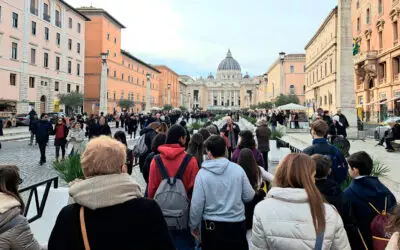 At the time that Chiara and her first companions began their adventure in Trent (Northern Italy) the town had a population of about ten thousand. The girls’ actions had a real effect on the people and also on the Church. Both the elderly and the young were left speechless seeing the unusual life lived by the girls living in the ‘little house’ in Piazza Cappuccini, the first ‘focolare’. In this humble apartment the poor were at home. In fact the social problems of the city, ruined by the War, were problems the girls made their own. They believed that they could solve the problems by simply believing the truth in the words of the Gospel. By loving each neighbour one after the other. Chiara wrote: ‘Among all the Words in the gospel we noticed immediately all those for our charism concerned specifically with evangelical love towards each neighbour, not only the poor, as when we read in the Gospel that Jesus had said “Whenever you did this for one of the least important of these brothers of mine (and that means everyone), you did it for me.” (Mt 25,40). Our old way of understanding our neighbour and loving them crumbled. If Christ was in some way in everyone, discriminations couldn’t be made, nor could preferences. Our normal way of reasoning of classifying people was thrown into the air: fellow country man or foreigner, old or young, beautiful or ugly, likeable or not, rich or poor, Christ was behind each one, Christ was in each one. “Another Christ” really was each neighbour – if grace enriched his soul – or “another Christ”, a Christ proud – if he was still far from Him. Living like this, we realised that our neighbour was our way to reach God. It seemed that our neighbour was an arch we had to pass under in order to meet God. We experienced this right from the start. In the evening, during prayers or in a moment of recollection, after we had loved God in our brothers all day we had such union with God. Who gave us that consolation, that interior balm which was so new, celestial if not Christ who, from His Gospel lived “give and you shall be given”? (Lk 6,38) We had loved Him all day in those brothers and now He loved us. This inner gift was such a benefit! They were the first experiences of the spiritual life, of the reality of a kingdom which is not of this earth. So, in the marvellous way that the Spirit showed us, love for our brother was a new cornerstone of our spirituality.’ Chiara Lubich, Nascita di una spiritualità, in Enzo M. Fondi e Michele Zanzucchi, Un popolo nato dal Vangelo, San Paolo, Cinisello Balsamo 2003, p. 18
At the time that Chiara and her first companions began their adventure in Trent (Northern Italy) the town had a population of about ten thousand. The girls’ actions had a real effect on the people and also on the Church. Both the elderly and the young were left speechless seeing the unusual life lived by the girls living in the ‘little house’ in Piazza Cappuccini, the first ‘focolare’. In this humble apartment the poor were at home. In fact the social problems of the city, ruined by the War, were problems the girls made their own. They believed that they could solve the problems by simply believing the truth in the words of the Gospel. By loving each neighbour one after the other. Chiara wrote: ‘Among all the Words in the gospel we noticed immediately all those for our charism concerned specifically with evangelical love towards each neighbour, not only the poor, as when we read in the Gospel that Jesus had said “Whenever you did this for one of the least important of these brothers of mine (and that means everyone), you did it for me.” (Mt 25,40). Our old way of understanding our neighbour and loving them crumbled. If Christ was in some way in everyone, discriminations couldn’t be made, nor could preferences. Our normal way of reasoning of classifying people was thrown into the air: fellow country man or foreigner, old or young, beautiful or ugly, likeable or not, rich or poor, Christ was behind each one, Christ was in each one. “Another Christ” really was each neighbour – if grace enriched his soul – or “another Christ”, a Christ proud – if he was still far from Him. Living like this, we realised that our neighbour was our way to reach God. It seemed that our neighbour was an arch we had to pass under in order to meet God. We experienced this right from the start. In the evening, during prayers or in a moment of recollection, after we had loved God in our brothers all day we had such union with God. Who gave us that consolation, that interior balm which was so new, celestial if not Christ who, from His Gospel lived “give and you shall be given”? (Lk 6,38) We had loved Him all day in those brothers and now He loved us. This inner gift was such a benefit! They were the first experiences of the spiritual life, of the reality of a kingdom which is not of this earth. So, in the marvellous way that the Spirit showed us, love for our brother was a new cornerstone of our spirituality.’ Chiara Lubich, Nascita di una spiritualità, in Enzo M. Fondi e Michele Zanzucchi, Un popolo nato dal Vangelo, San Paolo, Cinisello Balsamo 2003, p. 18
Don’t be afraid of difference!
Don’t be afraid of difference!




0 Comments